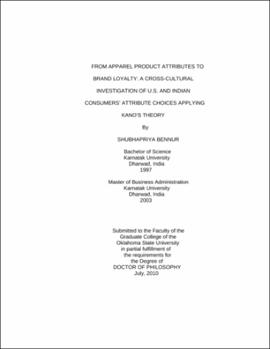| dc.contributor.advisor | Jin, Byoungho | |
| dc.contributor.author | Bennur, Shubhapriya | |
| dc.date.accessioned | 2013-11-26T08:23:21Z | |
| dc.date.available | 2013-11-26T08:23:21Z | |
| dc.date.issued | 2010-07 | |
| dc.identifier.uri | https://hdl.handle.net/11244/6697 | |
| dc.description.abstract | Scope and Method of Study: While prior studies have identified important apparel product attributes when consumers making purchase decision, previous studies failed to suggest the changes of important attribute over time. By comparing important product attributes in developed countries (U.S.) with developing countries (India), researchers will be able to anticipate the patterns of important attribute change. Previous researchers have identified the antecedents of brand loyalty. However, explanation as to how and through which paths these antecedents influence brand loyalty remains unclear. Therefore, a model that simultaneously examines the antecedents of brand loyalty is needed. This research consists of two phases. Phase I of this study aimed to identify and compare U.S. and Indian consumers' evaluations of apparel product attributes using Kano's theory. Phase II of this study proposed and tested a theoretical model to explain how consumers' benefit perceptions of an apparel brand leads to brand loyalty. Further, Phase II examined if country moderating effects exists in the proposed model paths. | |
| dc.description.abstract | Findings and Conclusions: In three hypotheses proposed in Phase I, one hypothesis was supported and two were partially supported, confirming that attributes classified into the must-be, performance, and attractive categories were different between U.S. and Indian consumers. The differences were attributed to consumers' level of exposure and experience with apparel products. Phase II of the study proposed five hypotheses, of which three hypotheses were supported, revealing that only hedonic benefit perceptions, not utilitarian benefits perceptions, positively influenced the enhancement of both brand trust and brand affect. Further brand affect enhanced brand loyalty. In Phase II, country moderating effects were tested on five paths of which three paths (hedonic benefit-brand affect, hedonic benefit - brand trust, and brand affect-brand loyalty) were found to be statistically significant. Based on these findings, theoretical and managerial implications were discussed. | |
| dc.format | application/pdf | |
| dc.language | en_US | |
| dc.rights | Copyright is held by the author who has granted the Oklahoma State University Library the non-exclusive right to share this material in its institutional repository. Contact Digital Library Services at lib-dls@okstate.edu or 405-744-9161 for the permission policy on the use, reproduction or distribution of this material. | |
| dc.title | From apparel product attributes to brand loyalty: A cross-cultural investigation of U.S. and Indian consumers' attribute choices applying Kano's theory | |
| dc.contributor.committeeMember | Johnson, Christine | |
| dc.contributor.committeeMember | Swinney, Jane | |
| dc.contributor.committeeMember | Cho, Hira | |
| dc.contributor.committeeMember | Gavin, Mark | |
| osu.filename | Bennur_okstate_0664D_11065.pdf | |
| osu.accesstype | Open Access | |
| dc.type.genre | Dissertation | |
| dc.type.material | Text | |
| dc.subject.keywords | brand affect | |
| dc.subject.keywords | brand trust | |
| dc.subject.keywords | cross culture | |
| dc.subject.keywords | indian consumer | |
| dc.subject.keywords | kano attributes | |
| thesis.degree.discipline | Human Environmental Sciences | |
| thesis.degree.grantor | Oklahoma State University | |
